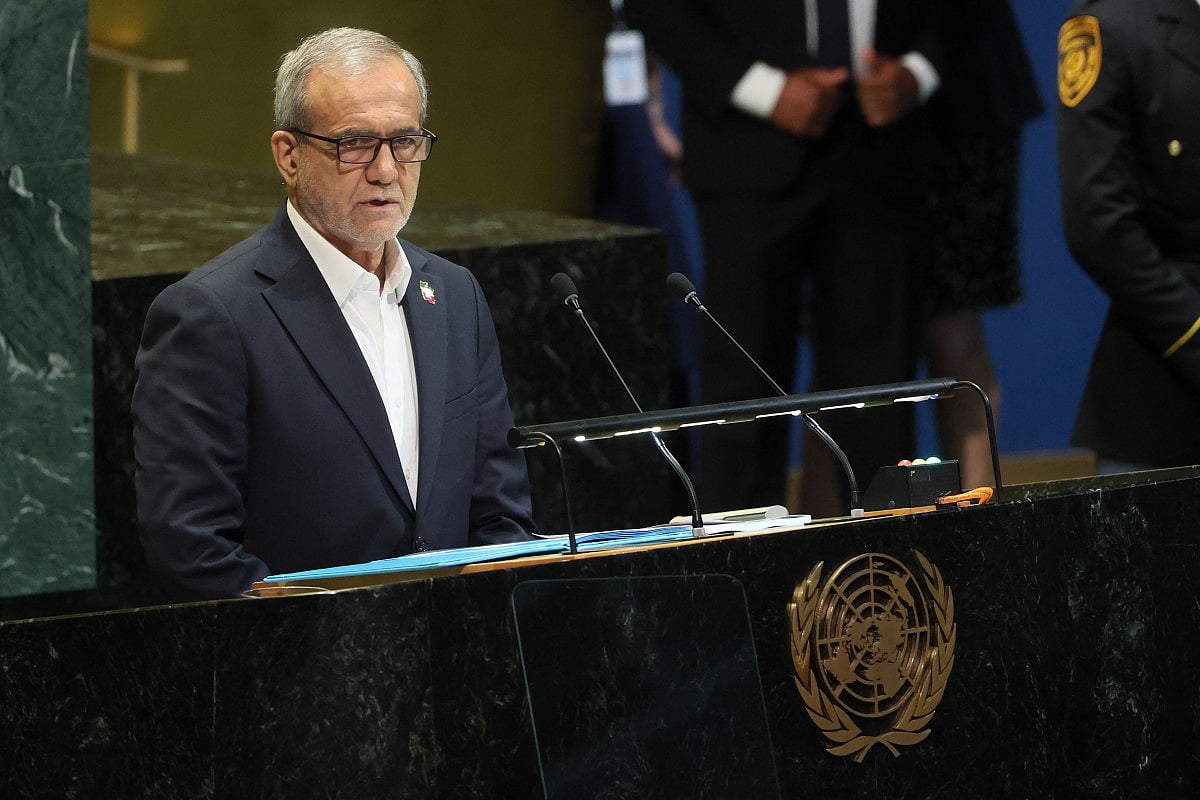At UN, Iran's president says US, Israeli attacks inflicted 'grievous blow' on international trust
Pezeshkian repeats Tehran’s claims that it does not seek a nuclear weapon

UNITED NATIONS: Iranian President Masoud Pezeshkian took the stage at the UN on Wednesday to blast Israeli and US attacks in June as inflicting “a grievous blow upon international trust and the very prospect of peace in the region.”
His comments at the General Assembly are the first time he has spoken in a global forum since the 12-day Israel-Iran war over the summer that saw the assassination of many of the Islamic Republic’s highest military and political leaders.
Pezeshkian is in New York as a series of crippling UN sanctions loom over Tehran if it does not make a deal with European leaders by Saturday.
But before even landing in New York, any diplomatic efforts by Pezeshkian and Iran’s foreign minister Abbas Araghchi were overshadowed when the country’s Supreme Leader, Ali Khamenei rejected any direct nuclear talks with the United States.
Pezeshkian also repeated Tehran’s claims that it does not seek a nuclear weapon through its domestic nuclear activities.
“I hereby declare once before this assembly that Iran has never and will never seek to build a nuclear bomb,” he said.
The president also criticised the Britain, German and France’s efforts to trigger the so-called “snapback” mechanism to reinstate sanctions — barring a last-minute accord — over Iran’s failure to comply with conditions of a 2015 nuclear deal aimed at preventing Tehran from developing nuclear weapons.
He said that the countries — known as the E3 — have operated in “bad faith” for years to dictate Iranian compliance with a deal that the U.S. abandoned in 2018. “They falsely presented themselves as parties of good standing to the agreement and they disparaged Iran’s sincere efforts as insufficient.
Rial hits a new low
Earlier, Iran’s rial currency fell to a new all-time low, reaching 1,074,000 to the US dollar just before Pezeshkian was due to address the United Nations.
The currency’s fall follows Iranian Supreme Leader Ayatollah Ali Khamenei rejecting direct talks with the United States over its nuclear program.
Khamenei’s announcement likely boxes in the diplomacy that Pezeshkian and Iranian Foreign Minister Abbas Araghchi could have done in New York. It also suggested that last-minute talks between Iran and European nations won’t stop the coming reimposition of UN sanctions on Iran over its nuclear program. A 30-day window to stop the sanctions will end Sunday.
France, Germany and the United Kingdom triggered the so-called snapback mechanism to reinstate sanctions — barring a last-minute accord — over Iran’s failure to comply with conditions of a 2015 nuclear deal aimed at preventing Tehran from developing nuclear weapons.
“Snapback” was designed to be veto-proof at the U.N. It started a 30-day window for the resumption of sanctions unless the West and Iran reach a diplomatic agreement.
European nations have said that they would be willing to extend the deadline, if Iran resumes direct negotiations with the US over its nuclear program, allows UN nuclear inspectors access to its nuclear sites, and accounts for the more than 400 kilograms (880 pounds) of highly enriched uranium that the UN watchdog says it has.
Iran is the only nation in the world that enriches uranium up to 60% — a short, technical step away from weapons-grade levels — that doesn't have a weapons program.
Sign up for the Daily Briefing
Get the latest news and updates straight to your inbox
Network Links
GN StoreDownload our app
© Al Nisr Publishing LLC 2026. All rights reserved.